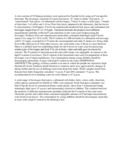High fluoride levels in some Kenyan beverages: a health risk.

View/
Date
1990Author
Opinya, GN
Mburu, DN
Birkeland, JM
Lökken, P
Language
enMetadata
Show full item recordAbstract
A cross section of 93 Kenyan products were analysed for fluoride levels using an F ion-specific electrode. The beverages consisted of 6 pure fruit juices, 25 "ready to drink" fruit juices, 11 "concentrated" fruit juices, 19 carbonated soft beverages, 7 beers, 6 wines, 6 milk types, 7 brands of chocolate, 3 of coffee and 3 of tea. Pure fruit juices, prepared in the laboratory, had the lowest F-concentrations (<0.05 ppm). F levels in commercially marketed fruit juices and carbonated soft beverages ranged from 0.1 to 15.0 ppm. Variations between the products from different manufacturers probably reflected F-concentrations in the water used for processing the beverages. Products from one manufacturer particularly contained alarmingly high F-levels (mean 11.6, range 8.3-15.0, n=29). The F-content of a 300-ml bottle of carbonated soft beverage with F 13.5 ppm, exceeded by 6.75 times the recommended total daily F-intake of a 10-kg child. Even if the child got no F from other sources, one such bottle a day is likely to cause fluorosis. There is a definite need for establishing limits for the F-levels in water used for processing certain types of beverages and food. F-levels in beers, wines and milk gave no reason for concern. The F-content of chocolate powder and coffee beans was negligible, in contrast to the high F-content of tea leaves. The F-content of the household water used for preparation of these beverages was of major significance. Tea consumption among young children should be discouraged, particularly in areas with high F-content in the water.ADDITIONAL ABSTRACT:The geology of Kenya renders it an area in which the people are exposed to high fluoride (F) levels. Endemic dental fluorosis is common and is now aggravated by changes in dietary habits and the use of drinking water from deep bore-holes. Water samples tested from Kenyan bore-holes frequently contained >1 p.p.m. F and 20% contained >5 p.p.m. The recommended level in drinking water for a hot climate is 0.7 p.p.m.
A wide range of beverages-fruit juices, carbonated soft drinks, beers, wines, milk, chocolate, coffee and tea, purchased in Nairobi in 1988, were analysed. Fresh fruit juice contained very little F but the levels in commercial drinks varied greatly, those from 1 manufacturer being alarmingly high (up to 15 p.p.m.) and representing a hazard to children. The variation between the products of different manufacturers probably reflected the F-content of the water used. Chocolate powder and coffee beans contained negligible amounts of F but high concentrations were found in tea leaves. Tea consumption by young children should be discouraged, especially in areas with a high F-content in the drinking water.
URI
http://www.cabdirect.org/abstracts/19911437435.html;jsessionid=389BC478E7AB789E659C295A240049A3http://hdl.handle.net/11295/89745
Citation
Discovery and Innovation 1990 Vol. 2 No. 1 pp. 91-96Publisher
University of Nairobi
Collections
- Faculty of Health Sciences (FHS) [10415]
